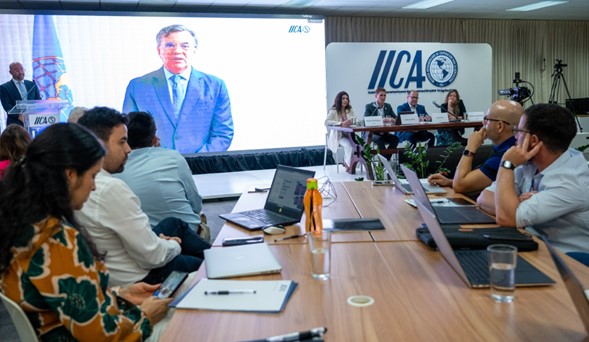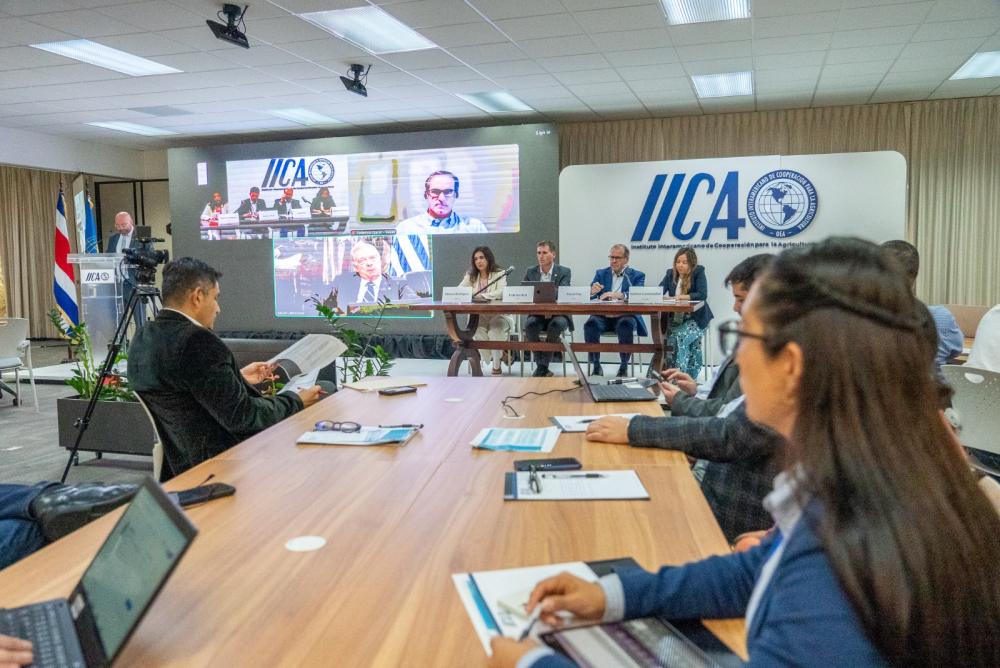Digital Agriculture Week is underway at IICA Headquarters, with the participation of Nobel Prize laureate Michael Kremer and many actors, and a focus on the generation of ideas and recommendations for the inclusive incorporation of new technologies into r

San José, 25 September 2024 (IICA). Selected AgTechs, developers, funders, academics (including Nobel Prize in Economics laureate Michael Kremer), policymakers and users were on hand as the Inter-American Institute for Cooperation on Agriculture (IICA) and its partners inaugurated the third edition of Digital Agriculture Week (DAW), a key space on an issue that is transforming agrifood systems across the continent and around the world.
On day one, it was emphasized that the main objective of DAW is to generate ideas and recommendations for concrete actions for the inclusive and sustainable transformation of agrifood systems based on the use of new technologies.
Since its inception in 2022, DAW has served as a forum for strategic thinking on the digitalization of agrifood systems, and as a catalyst for collective action. It is organized jointly by IICA, the CAF-Development Bank of Latin America and the Caribbean, the Economic Commission for Latin America and the Caribbean (ECLAC), the Consultative Group on International Agricultural Research (CGIAR), and Bayer.
Representatives of 16 AgTechs from 14 countries in the hemisphere, selected from among more than 150 candidates, have traveled to IICA’s Headquarters in San José, Costa Rica. They are participating in a space for dialogue and the coordination of actions with startups involved in the two previous editions of the event, and all will form part of IICA’s Agtech Network, which is designed to promote the dynamic, inclusive digitalization of agrifood systems in the Americas.
The participants in the opening ceremony included the Minister of Livestock, Agriculture and Fisheries of Uruguay, Fernando Mattos, who chairs the Inter-American Board of Agriculture (IABA), IICA’s highest governing body, representatives of the other organizing institutions, and Manuel Otero, Director General of IICA, Lloyd Day, Deputy Director General, and Federico Bert, Manager of the Institute’s Agrifood Digitalization Program.
The event proper then got underway with a Dialogue on Digitalization and the Future of Agriculture and Rural Areas. The participants were Michael Kremer, winner of the Nobel Prize in Economic Sciences in 2019 and IICA Goodwill Ambassador on Sustainable Development Issues; Laurens Klerkx, a Full Professor at both the University of Talca (Chile) and the University Wageningen (Netherlands); and Mariana Vasconcelos, CEO of Agrosmart, an agricultural technology startup.
Advantages for producers
“We have a great opportunity to incorporate systems that make life easier for producers. We face enormous challenges in our production processes, such as climate change and the incidence of diseases. Advancing digital education must be the priority, so that more producers have access to knowledge and digital tools that make their lives easier,” said Mattos.
The Uruguayan minister warned, however, that the gap in access to technology in production systems is still significant, even within individual countries.
Bayer’s Federico Garat emphasized the vital importance of the networking that IICA proposes: “AgTechs are the big businesses of the future and their role is extremely important. Digitalization facilitates higher productivity, because when we have data, we can monitor production processes and monetize those achievements, close the circle, and allow producers to be rewarded for the good practices they implement.”
Andrea Gardeazabal, from CGIAR, pointed to the fact that DAW underlines the importance of building multi-sector partnerships and warned that “technology alone will not save us unless we use it well. In agriculture, we have been talking about technological gaps for 20 years, while other sectors have advanced more quickly. It is time to change our approach. These meeting spaces can make a difference.”
Eduardo Chomali, from the CAF-Development Bank of Latin America and the Caribbean, suggested that technological inclusion “is not only a question of access, but also of knowledge and training. Looking to the future, therefore, we have a historic opportunity to position Latin America as a global benchmark, if we manage to integrate these technologies effectively to make us more competitive, more resilient and inclusive.”

“Contact and interaction among the region’s AgTechs are very important. The partnership that IICA is promoting must continue to develop when we return to our respective countries. Agriculture is a key element of development in Latin America and the Caribbean. We not only produce food, but also have a crucial role in the development of the countries,” remarked ECLAC’s Mónica Rodrigues.
A transformative force
Manuel Otero emphasized that digital technology will be the main transformative force for agrifood system development in the years ahead, in the Americas and across the globe.
“Digital technologies are essential to address the main challenges, which are increased productivity, sustainability, and the generation of inclusion and development opportunities for people, especially young people. It is impossible to imagine agricultural development without digital technologies,” the Director General of IICA underlined.
Lloyd Day pointed out that the digital transformation of agriculture was already underway, and gathering pace. IICA had a responsibility to support the member countries, maximizing benefits and minimizing the negative externalities that can adversely affect small farmers. “DAW allows us to learn from each other and showcase new ideas that will move us forward to another stage as far as the challenges of the 21st century are concerned,” he concluded.
How to include small farmers in the technological revolution was one of the main themes of the Dialogue on Digitalization and the Future of Agriculture and Rural Areas. This segment was notable for the participation of Michael Kremer, one of the founders of Precision Agriculture for Development (PAD), an organization that brought digital agricultural services to family farmers in Asia and Africa, providing them with technical assistance and rural extension, which is key to helping the weakest link in the agriculture sector obtain better yields and higher income.
Kremer used concrete information and data to explain how in different countries the information that small farmers receive through their smartphones on climate issues or good practices is making a difference. The next step will be to scale up innovations and ensure that the benefits reach millions of smallholders.
More information:
Institutional Communication Division.
comunicacion.institucional@iica.int